Choosing the Right Router
A router is a multipurpose power tool used for everything from hollowing out a space to making fancy bevels on edges. Woodworkers can use it to trim, shape, and carve elaborate shapes, as well as make joinery and edge profiles. When choosing a router, consider which features are most important for your woodworking needs. Because of its very versatility, there is no such thing as a single perfect router and you may have to accept some degree of compromise, depending on the range of applications you have in mind. Provided you remember the indisputable adage that you get what you pay for, you should not be disappointed.
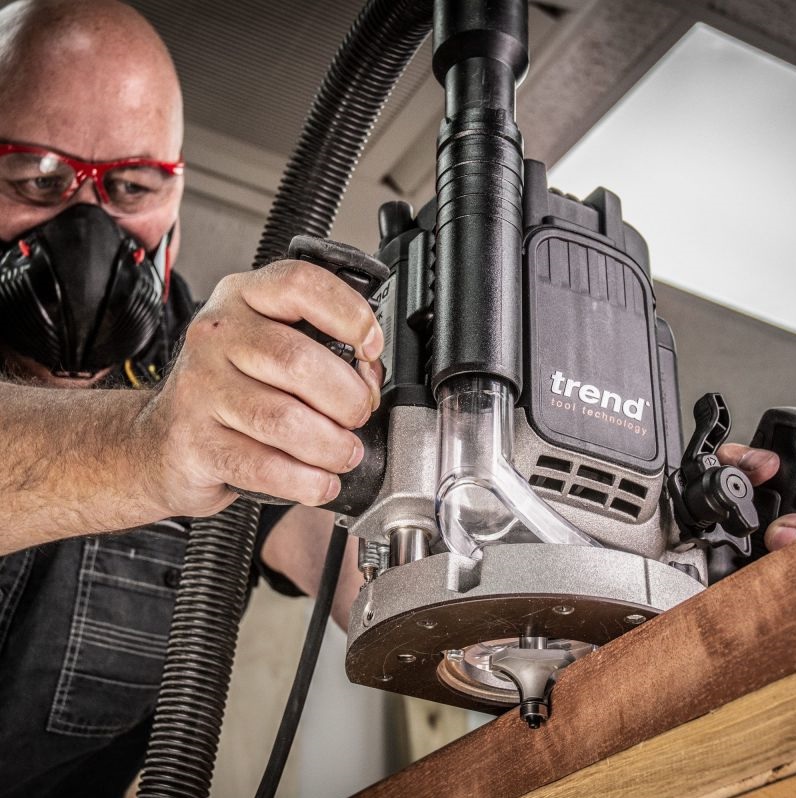
What are the types of router?
Fixed Base Router
A fixed base router is great for beginners, and simple to use because of the fixed base that is already at a predetermined depth. New users can focus on mastering their woodworking techniques thanks to the stationary base’s ease of use and reliability. Depth of cut is achieved by releasing the motor in the base, sliding it up or down, then re-clamping. These routers have more limitations than the plunge type, particularly when you have to start a cut in the middle of a piece of work.
Plunge Router
Today, the majority of routers sold into the European market are of the plunge type. Plunge routers can be used for a variety of tasks and provide accurate, detailed cuts inside a variety of materials. Plunge routers, in contrast to its fixed-base counterparts, have a spring-loaded base that allows the bit to be inserted into the wood to any depth. This makes them perfect for jobs like making inlays, complex carvings, and mortises. These have the motor mounted on a spring-loaded base which allows the cutter to be plunged into the work at the start of the cut and then retracted safely back into the base at the end. This plunge mechanism ensures that the cutter enters and leaves the work at 90° leaving a clean and square cut. The depth of plunge can be controlled with a series of pre-set stops and the depth is easily locked with either a dedicated lever or by twisting one of the handles.
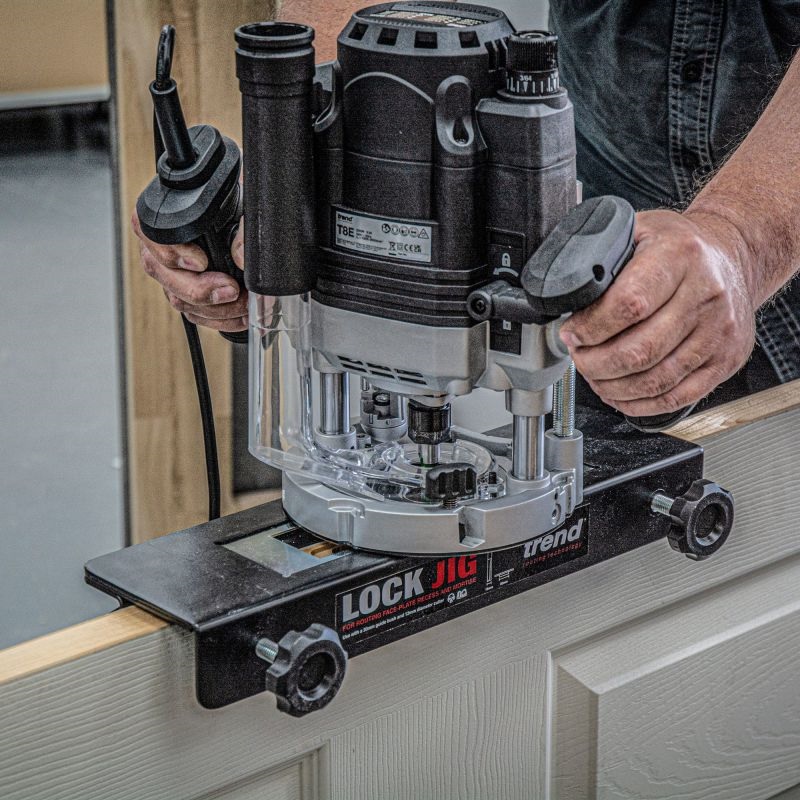
Trim Router
Trim routers, also called laminate trimmers, are small, lightweight routers built for accuracy. They are particularly good at cutting laminates and veneers, as well as finishing off smaller tasks. Trim routers are easy to handle and offer excellent control, making them an ideal choice for intricate detailing and edge trimming.
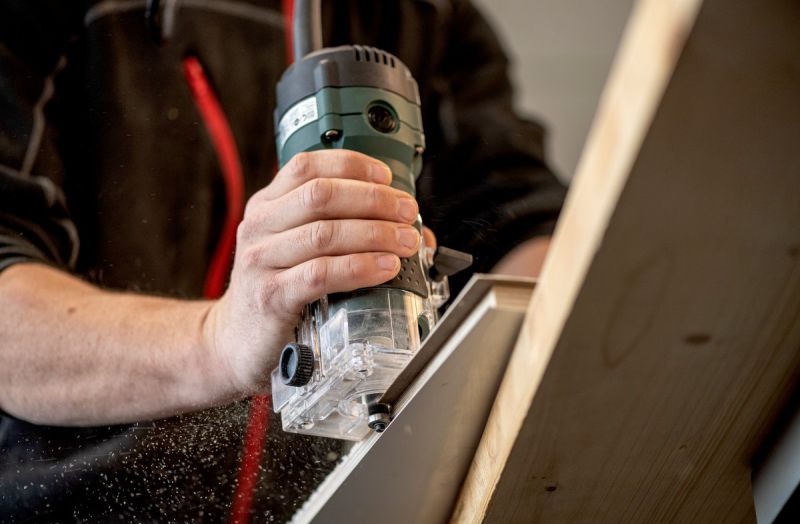
Does Size Matter?
A really powerful and heavy duty machine may boast an impressive specification, but when you try and guide it along a delicate piece of edge moulding, or use it in an elevated position, then the size and weight may make it very cumbersome to handle.
Heavy Duty Router
These are usually rated around 2000 watts and are suitable for all cutter shank diameters up to 1/2”, though the sheer power and high torque may lead to cutter failure if you start using small shank cutters carelessly.
They are suitable for the production of joinery components such as doors and frames, structural framing, staircases and general building work.
Although they can safely be used, hand-held routers of this power tend to be large and heavy which makes them unwieldy and awkward to handle in portable mode.
Heavy duty routers are therefore ideally suited for use inverted in a router table or in an overhead stand and this is actually essential when using some of the large diameter cutters.
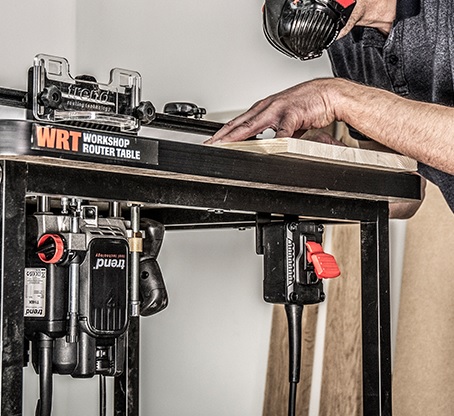
Medium Duty Router
With input ratings between 750 and 1200 watts, these routers will accept only the smaller collets, usually 1/4” but sometimes up to 8mm.
They are suitable for general furniture construction, cabinet making, and decorative moulding and inlay work.
The majority of DIY projects will be covered by a router of this size and they are powerful enough for use in machining centres or specialised jigs.
Light Duty Router
This category covers the input range between 400 and 750 watts, and their lower power restricts these routers to 1/4” collets.
They should only ever be used with cutters up to a maximum of 30 mm diameter, but then only for light cuts. Their small size makes them very easy to control for intricate trimming jobs, particularly if they can be guided using grips on the router base.
Many light duty routers have a removable plunge base which allows the motor to be used separately, or for fitting into a drill press for overhead routing and drilling applications.
The motor collar is normally a standard size of 43 mm to allow for this. Although being lower on power there is a definite place for these routers in the workshop.
Their very lightness makes them suitable for fine and intricate work such as inlaying, as well as veneer and laminate trimming, the motor body can also be used hand-held for carving operations.
Short runs of basic moulding, grooving or rebating are possible, provided the router is used sensibly and not overloaded.
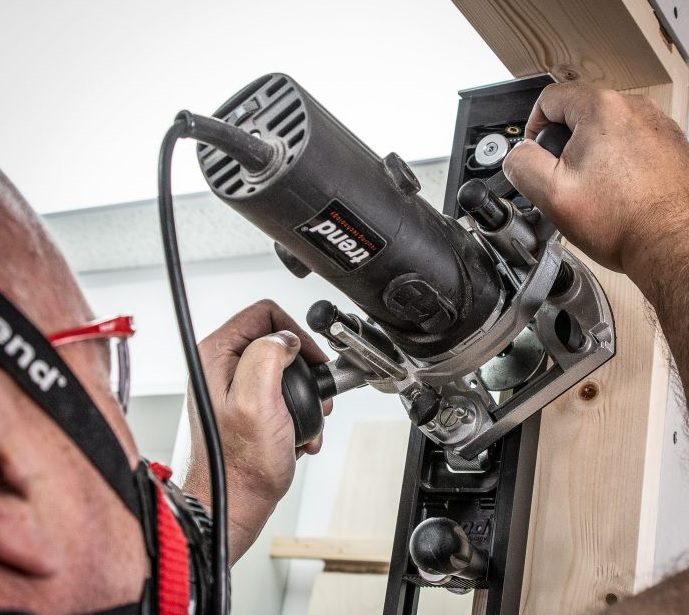
Power and Capacity
Routers are usually classified by their power and the maximum collet capacity they will accept. e.g. 750 watt, 1/4” shank or 1800 watt, 1/2” shank. Power is by far the most important factor that will determine how the router performs. The power quoted on the machine label is usually just the input power which is not what is delivered at the cutting edge. It is the output figure that actually represents the power available for cutting, once any friction has been overcome. From this it is apparent that the better the quality of manufacture the smaller the difference will be between the input and output figures and the more efficient the router will be.
Power will also determine how easily the rotational speed of the cutter is maintained under load. As soon as the motor starts slowing, the peripheral speed will drop and the resultant finish will suffer. More power means less speed variation under load and therefore cleaner cutting.
For the beginner wishing to attempt a range of household projects, such as simple furniture construction, a router of fewer than 1000 watts will limit the type of work you can undertake and the size of cutters you can use. A lower wattage router will also slow you down because the amount of material you can actually remove during each cut will be limited, as will the speed you can feed the router into the material.
Collet capacity is another useful indicator of a router’s capabilities. The most universal sizes are 1/4” and 1/2”, though 6mm, 8mm, 3/8” and 12mm are also available. Only heavy duty routers are designed to take the 3/8”, 12mm and 1/2” shank cutters, the lighter duty models being restricted to 1/4” or 8mm. There is of course no problem fitting a smaller collet into a heavy duty router, but you cannot fit a bigger collet into a small router.
It's important to remember that the diameter of the cutter shank determines how strong it will be. A large diameter cutter mounted on a thin shank will be weaker and more susceptible to higher flexing and bending stresses.
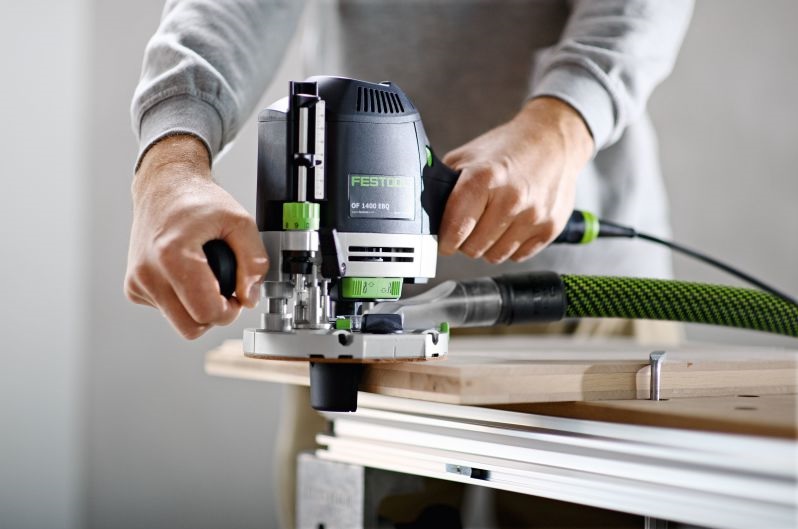
Features and Controls
Most routers share the same broad range of features and controls, all of which are designed to help you operate the machine both accurately and safely. However, the layout and ease of operation of these controls does vary enormously from router to router and you will find some arrangements suit you better than others. Factors such as the size of your hand, grip strength and whether you are left or right handed can make a tremendous difference to the handling when you are using the router.
For this reason it may be best to get a ‘hands on’ test of a router before you finally buy it. If all the controls are easy to operate you will then be able to concentrate fully on the work, rather than battle with the switch or plunge lock.
Find a more in depth guide to Router Features here
 Price
Price




 01726 828 388
01726 828 388












